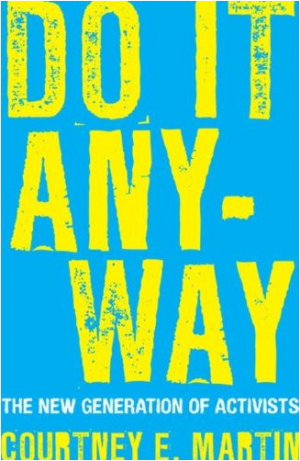Do It Anyway: The New Generation of Activists

Though editor Courtney E. Martin’s new book means to school baby boomer types who mock the millennial generation for their perceived apathy, Do it Anyway: The New Generation of Activists is a balm for burned out justice advocates of any age. Even its title acknowledges the enormous gap that lies between the fervent desires for “that hopey-changey thing” (as Sarah Palin joked) and the hard work needed to make it happen.
Do it Anyway shares the stories of eight young American activists, beginning with Rachel Corrie, the twenty-year-old crushed to death in 2003 by Israeli tanks when she attempted to defend Palestinian homes on the Gaza Strip. While Martin sympathizes with Corrie's idealism, she is blunt in her appraisal: “I am reminded,” Martin writes, “of how irresistible and yet how deeply false the romance of young death really is.” Corrie's death ought to be seen as a waste of unrealized talent, not as a paragon of youthful heroism. Martin implores her readers to consider, as she puts it, “'live people' for our inspiration.”
And what “live people” they are. The rose-colored outlook of a middle-class white girl like Corrie contrasts sharply with that of Maricela Guzman, a daughter of illegal immigrants who joined the military to climb out of poverty. Instead, her brutal rape at the hands of a superior officer sparked a new mission: advocating for survivors of sexual violence as co-founder of the Service Women's Action Network. Philanthropist Tyrone Boucher and filmmaker Emily Abt both renounce material privilege in their justice work; actress Rosario Dawson leverages her celebrity to draw attention to little-served causes.
All seven “live people” in the book open their mouths, hearts, and lives to Martin, granting her access to public schools in the Bronx and gang-riddled streets in Los Angeles (Martin, as learned as any Third Waver on the messiness of identity politics, is careful to balance her subjects’ races, genders, social classes, and areas of activist expertise).
Martin's concluding chapter is her masterstroke: called “Good Failure,” it offers practical lessons learned in the field and on the ground that, while not claiming to be lifesaving (Martin is uncertain that Rachel Corrie was interested in anyone's advice), will go a long way towards avoiding the burnout that can derail any activist's career. “I was repeatedly shattered,” Martin writes, “at how much emotional pain all of these people have had to endure in order to do their work.” Ultimately, a greater truth was revealed: “our charge is not to 'save the world' after all; it is to live in it, flawed and fierce, loving and humble.”
For anyone already committed to or just beginning to enter the world of social justice, Do it Anyway is a must-read.